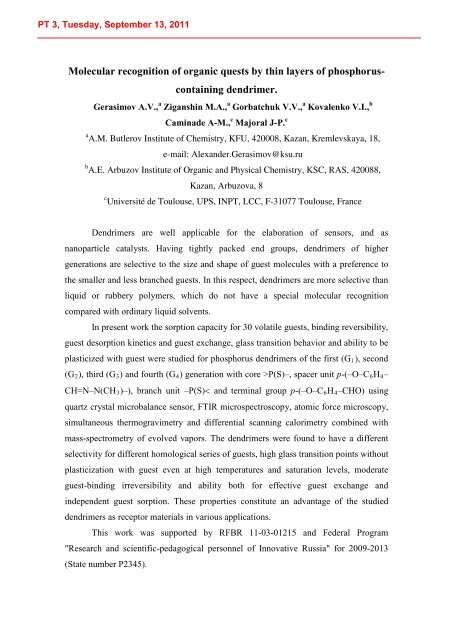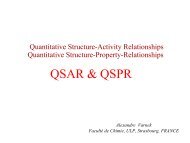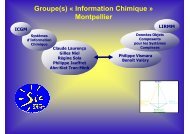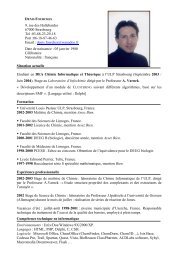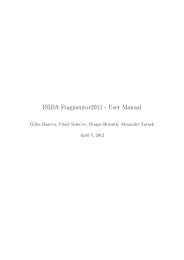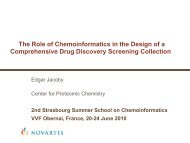International Summer School PROGRAM - Laboratoire d'Infochimie ...
International Summer School PROGRAM - Laboratoire d'Infochimie ...
International Summer School PROGRAM - Laboratoire d'Infochimie ...
Create successful ePaper yourself
Turn your PDF publications into a flip-book with our unique Google optimized e-Paper software.
Molecular recognition of organic quests by thin layers of phosphorus-<br />
a<br />
containing dendrimer.<br />
Gerasimov A.V., a Ziganshin M.A., a Gorbatchuk V.V., a Kovalenko V.I., b<br />
Caminade A-M., c Majoral J-P. c<br />
A.M. Butlerov Institute of Chemistry, KFU, 420008, Kazan, Kremlevskaya, 18,<br />
e-mail: Alexander.Gerasimov@ksu.ru<br />
b A.E. Arbuzov Institute of Organic and Physical Chemistry, KSC, RAS, 420088,<br />
Kazan, Arbuzova, 8<br />
c<br />
Université de Toulouse, UPS, INPT, LCC, F-31077 Toulouse, France<br />
Dendrimers are well applicable for the elaboration of sensors, and as<br />
nanoparticle catalysts. Having tightly packed end groups, dendrimers of higher<br />
generations are selective to the size and shape of guest molecules with a preference to<br />
the smaller and less branched guests. In this respect, dendrimers are more selective than<br />
liquid or rubbery polymers, which do not have a special molecular recognition<br />
compared with ordinary liquid solvents.<br />
In present work the sorption capacity for 30 volatile guests, binding reversibility,<br />
guest desorption kinetics and guest exchange, glass transition behavior and ability to be<br />
plasticized with guest were studied for phosphorus dendrimers of the first (G1), second<br />
(G2), third (G3) and fourth (G4) generation with core >P(S)–, spacer unit p-(–O–C6H4–<br />
CH=N–N(CH3)–), branch unit –P(S)< and terminal group p-(–O–C6H4 –CHO) using<br />
quartz crystal microbalance sensor, FTIR microspectroscopy, atomic force microscopy,<br />
simultaneous thermogravimetry and differential scanning calorimetry combined with<br />
mass-spectrometry of evolved vapors. The dendrimers were found to have a different<br />
selectivity for different homological series of guests, high glass transition points without<br />
plasticization with guest even at high temperatures and saturation levels, moderate<br />
guest-binding irreversibility and ability both for effective guest exchange and<br />
independent guest sorption. These properties constitute an advantage of the studied<br />
dendrimers as receptor materials in various applications.<br />
This work was supported by RFBR 11-03-01215 and Federal Program<br />
"Research and scientific-pedagogical personnel of Innovative Russia" for 2009-2013<br />
(State number P2345).


